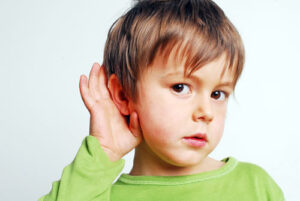APD vs ADHD: Similarities & Differences
APD can manifest in many ways and is highly individualized from child to child. Due to this, APD can mimic and present either very similar to other diagnoses or alongside other diagnoses that can affect children.
A very common disorder that is similar to APD is Attention Deficit Hyperactivity Disorder or ADHD. Some symptoms of APD and ADHD can look similar, and it is easy for one to be mistaken for the other. However, ADHD and APD are two distinct disorders with a different internal cause.
Individuals with APD have a neurological defect that affects the brain’s ability to recognize and interpret the sounds it receives. Since these individuals struggle to process what they hear, it causes listening problems that often mimic a hearing loss. Children with APD may stop paying attention because they are having trouble understanding.

Individuals with ADHD may be poor listeners and have trouble remembering spoken information because ADHD affects the brain’s ability to stay focused. However, the attention deficit impedes their ability to use the auditory information coming in, not the processing of it in the brain.
The primary concerns reported by parents and teachers also differ in children with ADHD versus children with APD. In individuals with APD, primary complaints are poor listening skills in background noise and frequent requests for clarification, whereas for individuals with ADHD, the biggest concerns are complaints of inattentiveness and/or hyperactivity. Children with APD may become inattentive due to fatigue or frustration from trying to keep up with ongoing speech in the classroom. This is how APD can be misinterpreted as ADHD.
|
ADHD |
APD |
| 1. Inattentive | 1. Difficulty hearing in background noise |
| 2. Distracted | 2. Difficulty following oral instructions |
| 3. Hyperactive | 3. Poor listening skills |
| 4. Fidgety/Restless | 4. Academic difficulties |
| 5. Hasty/Impulsive | 5. Poor auditory association skills |
| 6. Interrupts/Intrudes | 6. Distracted |
| 7. Inattentive |
The above chart can be useful to compare the type of issues most frequently reported. However, since APD and ADHD frequently coexist, distinguishing the two disorders requires multidisciplinary assessment including a battery of tests to evaluate the central auditory nervous system.
Characteristics of APD that children with ADHD alone do not generally exhibit:
- Children with APD often struggle to blend sounds when learning to read and may struggle to learn phonics. Since APD affects the ability to distinguish similar-sounding sounds, this in turn affects a child’s ability to learn how letters represent those sounds.
- Children with APD are generally able to focus and pay attention in quiet environments, while children with ADHD tend to exhibit inattention, distractibility, and hyperactivity in any environment.
- Children with APD are often highly sensitive to sounds around them. Even in a quiet environment, they may be unusually bothered by soft sounds like the ticking of a clock, humming from air conditioners, or children whispering and wiggling in their seats. They may also get upset in places with loud noises like shopping malls and cover their ears in noisy environments.
- Children with APD may have been speech-delayed and may continue to have pronunciation issues even after they have been receiving speech-language therapy.
- Children with APD show signs of hearing problems even though hearing tests are normal. They frequently say “what?” or “huh” and mishear things. They may not recognize subtle differences between sounds in words (i.e., “pig” ‘big” and “dig”) and have trouble keeping up with ongoing speech in the classroom.
Only an audiologist professionally trained in specialized tests to evaluate the central auditory nervous system can diagnose or rule out auditory processing disorder. A battery of tests must be used because there are different types of APD. Some types can be completely corrected, and some skills can improve considerably with therapy.
Ferre, Jeanane M. (2016) Tips for the Differential Diagnosis of Central Auditory Processing Disorders (CAPD) Case Studies by
ASHA Professional Development
Lucker J (2012) What school psychologists need to understand about auditory processing disorders. Division 16 of School
Psychology, April 2012
Lucker, J. (2013) What are Auditory Processing Disorders Really All About?
Katz, J. (2007). APD Evaluation to Therapy http://www.audiologyonline.com/articles/article_detail.asp?article_id=1803
Moncrieff, D, Keith, W, Abramson, M and Swann, A (2016) Diagnosis of amblyaudia in children referred for auditory
processing assessment, International Journal of Audiology.
